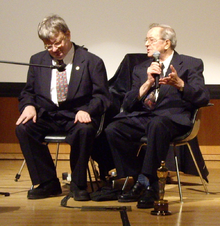- Kim Peek
-
Kim Peek 
Born Laurence Kim Peek
November 11, 1951
Salt Lake City, Utah, U.S.Died December 19, 2009 (aged 58)
Murray, Utah, U.S.Cause of death Heart attack Nationality American Ethnicity White American Known for Megasavant Religion The Church of Jesus Christ of Latter-day Saints Parents Frank Peek, Jeanne W. Buchi Laurence Kim Peek (November 11, 1951 – December 19, 2009) was an American savant. Known as a "megasavant",[1][2][3] he had a photographic or eidetic memory, but also social difficulties, possibly resulting from a developmental disability related to congenital brain abnormalities. He was the inspiration for the character of Raymond Babbitt, played by Dustin Hoffman, in the movie Rain Man. Unlike Babbitt, Peek was not autistic[4] and likely had FG syndrome.[5]
Contents
Early life
Peek was born in Salt Lake City, Utah[6] with macrocephaly,[citation needed] damage to the cerebellum, and agenesis of the corpus callosum,[7] a condition in which the bundle of nerves that connects the two hemispheres of the brain is missing; in Peek's case, secondary connectors such as the anterior commissure were also missing.[citation needed] There is speculation that his neurons made unusual connections due to the absence of a corpus callosum, which resulted in an increased memory capacity.[8][9] According to Peek's father, Fran Peek, Kim was able to memorize things from the age of 16–20 months. He read books, memorized them, and then placed them upside down on the shelf to show that he had finished reading them, a practice he maintained. He read a book in about an hour, and remembered almost everything he had read, memorizing vast amounts of information in subjects ranging from history and literature, geography, and numbers to sports, music, and dates. According to an article in the Times newspaper, he could recall the content of at least 12,000 books from memory.[6] Peek lived in Murray, Utah.[10]
Peek did not walk until the age of four and then in a sidelong manner.[8] He could not button up his shirt and had difficulty with other ordinary motor skills, presumably due to his damaged cerebellum, which normally coordinates motor activities. In psychological testing, Peek scored below average (87) on general IQ tests.[11]
Rain Man
In 1984, screenwriter Barry Morrow met Peek in Arlington, Texas; the result of the meeting was the 1988 movie Rain Man. The character of Raymond Babbitt, although inspired by Peek, was portrayed as having autism. Dustin Hoffman, who played Babbitt, met Peek and other savants to get an understanding of their nature and to play the role accurately and methodically. The movie caused a number of requests for appearances, which increased Peek's self-confidence. Barry Morrow gave Kim his Oscar statuette to carry with him and show at these appearances; it has since been referred to as the "Most Loved Oscar Statue" as it has been held by more people than any other. Kim also enjoyed approaching strangers and showing them his talent for calendar calculations by telling them on which day of the week they were born and what news items were on the front page of major newspapers. Peek also appeared on television. He travelled with his father, who took care of him and performed many motor tasks that Peek found difficult.[8]
Life after Rain Man
Unlike many savants, Peek had shown increasing social skills, perhaps due to the attention that had come with being perceived as the "real Rain Man". His father says that his sense of humor had been emerging since 2004 or so. Also, he had developed well beyond the stage of being a mere repository of vast amounts of information; his skills at associating information he remembered were at least one of the signs of creativity. He displayed difficulty with abstractions such as interpreting the meanings of proverbs or metaphorical terms of speech.[citation needed]
Although never a musical prodigy, Peek's musical abilities as an adult received more notice when he started to study the piano. He apparently remembered music he had heard decades before, and could play it on the piano to the extent permitted by his limited physical dexterity. He was able to give a running commentary as he played, for example, comparing a piece to other music he had heard. Listening to recordings, he could distinguish which instruments played which part and was adept at guessing the composers of new music by comparing the work to the many thousands of samples in his memory.[citation needed]
In 2004, Peek met another savant, Daniel Tammet, for the UK Channel Five documentary The Boy with the Incredible Brain.[12] He hugged Tammet and said "Some day you'll be as great as I am."
Scientific investigation
In 2004, scientists at the Center for Bioinformatics Space Life Sciences at the NASA Ames Research Center examined Peek with a series of tests including computerized tomography and magnetic resonance imaging. The intent was to create a three-dimensional view of his brain structure and to compare the images to MRI scans done in 1988. These were the first tentative approaches in using non-invasive technology to further investigate Kim's savant abilities.[13]
A 2008 study concluded that Peek probably had FG syndrome, a rare genetic syndrome linked to the X chromosome which causes physical anomalies such as hypotonia (low muscle tone) and macrocephaly (abnormally large head).[5]
Death
Peek died of a heart attack on December 19, 2009.[10][14]
Appearances
- Brainman, a Discovery Channel documentary
- Inside the Rain Man, a Discovery Channel documentary
- Everything You Need To Know - The Brain, a Discovery Channel documentary
- Human Computer, a Discovery Channel documentary
- Medical Incredible, a Discovery Health Channel documentary
- The Real Rain Man, a Discovery Health Channel documentary premiered on November 26, 2006
- Ripley's Believe It or Not!
- CNN interview by Richard Quest
- "The Real Rain Man". Focus Productions. Extraordinary People. RTL Group. Five.
- World's Smartest People on The Learning Channel
- Kim and his father were speakers at the inaugural meeting of the Athanasius Kircher Society.[15]
- Speaker at the Oxford Union
- 60 Minutes
- Accidental Genius, a National Geographic Channel documentary
- Superhuman, "Genius" episode, a Science Channel special premiered on November 7, 2008
- Beautiful Minds: A Voyage Into the Brain, a documentary produced in 2006 by colourFIELD tell-a-vision, a German company
- Den Riktiga Rain Man (The Real Rain Man), a Swedish documentary that was aired July 6th 2006 across the country's channel four (TV-4) TV-station
References
- ^ "'Rain Man' reigns in Casper". Casper Star-Tribune. March 14, 2003. http://www.casperstartribune.net/articles/2003/03/13/news/casper/9f255dee714ad4b37448c4ae702ff00f.txt. Retrieved 2009-07-21. "The difference between a savant and a megasavant like Peek is that Peek has nearly total recall in around 14 to 15 different subject areas, according to literature written by Peek's father, Fran Peek."
- ^ "About Kim Peek, Megasavant". York Daily Record. November 4, 1994. http://nl.newsbank.com/nl-search/we/Archives?p_product=YK&p_theme=yk&p_action=search&p_maxdocs=200&p_topdoc=1&p_text_direct-0=0EB291FA0476C393&p_field_direct-0=document_id&p_perpage=10&p_sort=YMD_date:D&s_trackval=GooglePM. Retrieved 2009-07-21. "Kim Peek is a megasavant who has memorized vast numbers of facts about more than a dozen subjects. He has brain damage, which occurred before birth, but he is not autistic."
- ^ "NASA studies mega-savant Peek's brain". USA Today. Associated Press. 2004. http://www.usatoday.com/news/science/2004-11-08-nasa-rain-man_x.htm. Retrieved 2009-07-21. "The 53-year-old Peek is called a "mega-savant" because he is a genius in about 15 different subjects, from history and literature and geography to numbers, sports, music and dates."
- ^ Weber B (26 December 2009). "Kim Peek, inspiration for 'Rain Man,' dies at 58". The New York Times. Retrieved 08 January, 2010.
- ^ a b Opitz JM, Smith JF, Santoro L (September 2008). "The FG syndromes (Online Mendelian Inheritance in Man 305450): perspective in 2008". Adv Pediatr 55 (1): 123–70. doi:10.1016/j.yapd.2008.07.014. PMID 19048730.
- ^ a b "Kim Peek: savant who was the inspiration for the film Rain Man". The Times. 2009-12-23. http://www.timesonline.co.uk/tol/comment/obituaries/article6965115.ece. Retrieved 2009-12-23.
- ^ "The Real Rain Man", documentary by Focus Productions, Bristol, England, UK, 2006.
- ^ a b c Savant Syndrome at the Wayback Machine (archived February 6, 2007) Wisconsin Medical Society.
- ^ Kim Peek - The Real Rain Man. Wisconsin Medical Society.
- ^ a b Stephenson, Kathy. "Kim Peek, Murray man who inspired 'Rain Man', dies", The Salt Lake Tribune. December 22, 2009.
- ^ "Inside the Mind of a Savant" Darold A. Treffert and Daniel D. Christensen. Scientific American. December 23, 2009.
- ^ [1]
- ^ "NASA Studying 'Rain Man's' Brain"; Associated Press/Space.com, November 8, 2004.
- ^ Weber, Bruce. "Kim Peek, Inspiration for 'Rain Man,' Dies at 58". The New York Times. December 27, 2009.
- ^ Video from Kircher Society extravaganza
Further reading
- Treffert, Darold A. & Christensen, Daniel D. "Inside the Mind of a Savant". Scientific American. December 2005. (requires subscription).
- "NASA Studying 'Rain Man's' Brain". Space.com. Associated Press. November 8, 2004. http://www.space.com/scienceastronomy/nasa_peek_041108.html.
- Peek, Fran (1996). The Real Rain Man: Kim Peek. Salt Lake: Harkness. ISBN 0-9651163-0-1.
- Portions of the text are the work of the Wisconsin Medical Society and Darold A. Treffert, M.D."Kim Peek - The Real Rain Man"
External links
- Kim Peek-The Real Rain Man - Wisconsin Medical Society
- Video of the Athanasius Kircher Society Presentation
Categories:- 1951 births
- 2009 deaths
- American Latter Day Saints
- Cardiovascular disease deaths in Utah
- Deaths from myocardial infarction
- People from Murray, Utah
- People from Salt Lake City, Utah
- People with eidetic memory
Wikimedia Foundation. 2010.

